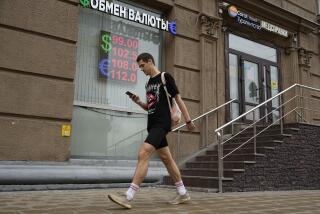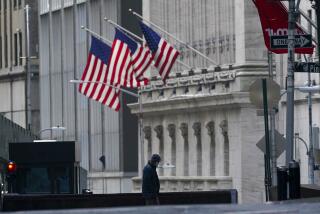Russian Financial Crisis Worsens, but Politicians Dismiss Concerns
- Share via
MOSCOW — The global economic firestorm further engulfed Russia on Thursday, and leaders here seemed even less eager than Japan’s to undertake the reforms the rest of the world is demanding.
Russian politicians responded with expressions of defiance and denial to the spreading concern that their vast country’s economy is in free fall, the ruble threatened with devaluation and debt default a growing possibility.
“Craziness” was how Prime Minister Sergei V. Kiriyenko dismissed the market panic that knocked shares to a 27-month low and sent three-month treasury bill yields up to nearly 200%. “There are no financial grounds for a deterioration in the situation.”
The latest panic followed a government attempt to prop up the ruble, limiting banks’ foreign currency operations in an effort to stop them from selling the hard-pressed Russian currency.
The new banking rules adopted Wednesday night backfired. Instead of calming the markets, they only added to traders’ fears and renewed worries that a devaluation is imminent.
On the inter-bank market, foreign exchange trading failed to start as usual Thursday morning, with bankers too frightened by the shaky situation to risk transactions. Shares ended 6.5% lower after initial drops of 15%, although trading was minimal. Some blue-chip stocks fell by as much as 30%.
Investors have fled Russia’s chaotic financial markets over the last two months, afraid that the government will not be able to cover more than $23 billion in debt payments due this year as its foreign exchange reserves dwindle. It might be forced to drop the commitment to a stable ruble that has been the cornerstone of its economic policy.
Foreign exchange and gold reserves have fallen by $1.4 billion to $17 billion in the last week. The money has been used to prop up the ruble.
In recent days, many banks have stopped making payments to one another and to investors. Some are struggling to repay international loans that come due next week. Several are in talks with creditors.
Late in the day, Moody’s Investors Service cut the credit rating of several banks, and Standard & Poor’s reviewed the government’s debt rating. Even before the downgrades, Russia’s foreign debt was ranked as “junk,” or speculative.
“The risk of currency devaluation has grown,” Moody’s said in a statement, adding that such a move “would have severely negative consequences” for the economy.
With trust dwindling in the Russian government’s will to impose an austerity program, a $22.6-billion international bailout last month has done nothing to reassure the markets. In return for the rescue package, Russia promised to improve tax collection and overhaul its finances.
The Kremlin said President Boris N. Yeltsin, who has been out of town on vacation for the last few hair-raising days, had told his young prime minister to “steadfastly fulfill the plan of action.”
Meanwhile, international pressure mounted. In Washington, the White House confirmed that senior officials of the Group of Eight--comprising the United States and its major trading partners--and the International Monetary Fund had told top Russian policymakers in a conference call Thursday that they must move rapidly to restore stability.
However, Western officials indicated that neither Washington nor the IMF was likely to step in with additional financial aid for Russia beyond the $22.6-billion package assembled by the IMF.
“We are following the developments in Russia very closely,” White House Press Secretary Mike McCurry said. “It is very critical that the Russian government act quickly. The international community has a big stake in seeing that Russia gets its economy moving in the right direction.”
As the Russian panic pushed other European markets down, the German Finance Ministry declared, “We urge Russia to speed up the implementation of those reforms.”
But just as Japan’s leaders have been slow in reacting to that nation’s economic crisis, political dissent inside Russia continued to hamper reform efforts. The Russian parliament, which is dominated by Communists, opposes all attempts at austerity and wants the government to first honor wage debts to millions of state-sector workers who have gone unpaid for months.
Apart from the tiny minority of Russians who now work in the financial sector, Thursday’s financial crisis was all but ignored by the general public. Since most Russians do not have mortgages or own stock, they are protected from the market shocks that affect ordinary citizens in mainstream capitalist countries. In a country whose people by and large believe their government is made up of the unscrupulous and self-serving, few take politicians’ public words seriously.
“Oh, it’s just more blah-blah about the economy,” said Larissa de Ville, a Moscow doctor, turning off the television news with its lists of depressing financial figures. “What will they think up next to torment us with?”
*
Staff writer Art Pine in Washington contributed to this story.
(BEGIN TEXT OF INFOBOX / INFOGRAPHIC)
Misery in Moscow
Russian stocks have plunged in recent months on fears that the country’s banking system, and the ruble’s value, may collapse. Monthly closes and latest for the Russian/Skate Press general share index:
Thursday: 485.70
Source: Bloomberg News
More to Read
Sign up for Essential California
The most important California stories and recommendations in your inbox every morning.
You may occasionally receive promotional content from the Los Angeles Times.













